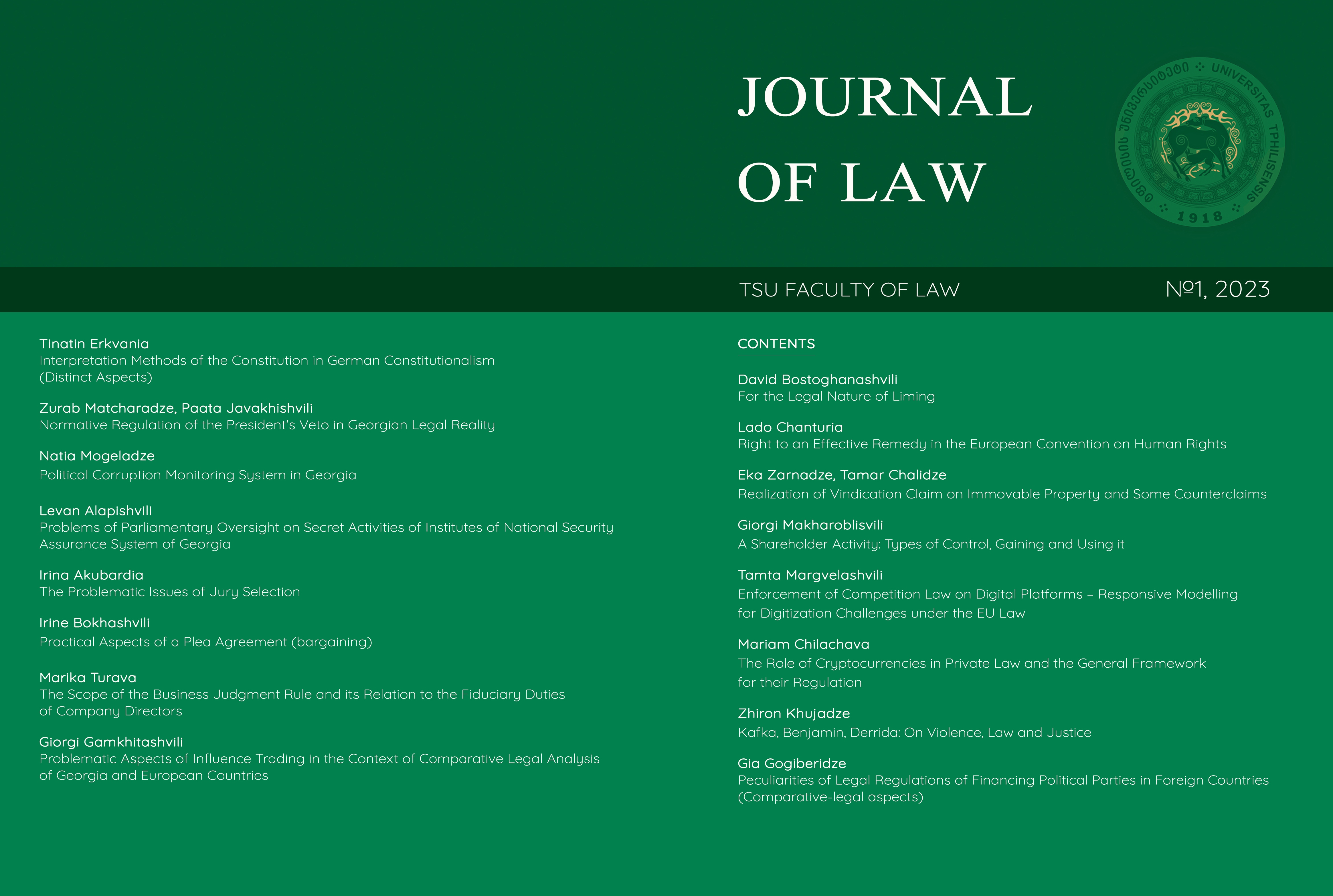Political Corruption Monitoring System in Georgia
DOI:
https://doi.org/10.60131/jlaw.1.2023.7069Keywords:
political corruption, voter bribery, monitoring, transparency, donation, mandate, anti-corruption agency.Abstract
Georgia treated combating corruption, a harmful socio-political phenomenon, as one of the top priorities of public policy and, sharing international experience, has defined the regulation of the legality of political finance as an important element of the anti-corruption strategy.
In 2011, material changes were introduced in the Organic Law of Georgia on Political Associations of Citizens. The reform offered a completely new political corruption monitoring system in the country. They established the Financial Monitoring Service of Political Parties within the State Audit Office of Georgia with the main task to control the legality and transparency of political finance. To that end, the Monitoring Service was assigned to monitor and ensure the transparency of the revenues and expenses of the political parties and also was given the power to apply administrative proceedings and sanctions.
Since 2022, this mandate, along with other anti-corruption duties, has been granted to a legal entity under public law - the Anti-Corruption Bureau, which is independent in its operations and reports only to the Parliament of Georgia and the Interagency Anti-Corruption Council.
We will try in this study, giving due consideration to the best international practices, to analyze the specifics of the agencies controlling political corruption and assess the outcomes of their operations in the scope of the mandate. We will discuss the problems that remain a challenge based on the legislation applicable today and are a bar to the process of developing a more effective and result-oriented anti-corruption system.
References
United Nations Convention Against Corruption (UNCAC), 2003, Article 6.
Organic Law of Georgia on Political Associations of Citizens, 31/10/1997.
Organic Law of Georgia on the State Audit Office, 26/12/2008.
Criminal Code of Georgia, 22/07/1999.
Law of Georgia on Combating Corruption, 17/10/1997.
Decree No 550 of 24 June 2005 of the President of Georgia approving the National Anti-Corruption Strategy of Georgia.
Venice Commission and OSCE/ODIHR – Joint Opinion on the Draft Election Code of Georgia, Strasburg, 2011, https://www.venice.coe.int/webforms/documents/default.aspx?pdffile=CDL(2011)094-e, [24.02.2023].
Order No 10/37 of 23 January 2012 of the Chairman of the Chamber of Control of Georgia on approval of financial statement forms of political associations of citizens and instructions for filling them out
Amundsen I., Political Corruption, CMI (Chr. Micheslen Institute), U4 Anti Corruption Resourse Centre, (U4 Issue 2006:6, 5.
Commission Opinion on Georgia's application for membership of the European Union, Brussels, 17 June 2022,12.
Fighting Corruption in Eastern Europe and Central Asia, Anti-corruption reforms in Georgia, 4 th round of monitoring of the Istanbul Anti-Corruption Action Plan, 2016.
Fourth Evaluation Round Corruption Prevention in Respect of Members of Parliament, judges and prosecutors, Evaluation Report Georgia, Adopted by GRECO at its 74th Plenary Meeting, Strasbourg, 28 November - 2 December, 2016.
GRECO (Group of States Against Corruption) Evaluation Report on Georgia on Incriminations, Strasbourg, 2011, https://rm.coe.int/16806ca044 [24.02.2023].
Herbert E.A., Shiratori R., (eds), Comparative Political Finance Among the Democracies, Boulder, Colorado: Westview, 1994, 15.
International Society for Fair Elections and Democracy, Final Report of 2020 Parliamentary Election Monitoring, 34.
Kabanov P.A., Political Corruption in Russia: Concept, Essence and Main Forms of Manifestation №10, 2002, 33 (in Russian).
OECD Anti-Corruption Network for Eastern Europe and Central Asia, Specialised Anti-Corruption Institutions: Review of Models, 2008, 21-24, 31-38.
Ohman M., Falguera E., Jones S. (eds.), Funding of Political Parties and Election Campaigns, A handbook on Political Finance, International IDEA, Stockholm, Sweden, 2014, 366-391.
Ohman M., Introduction to Political finance, Global Commission on Elections, Democracy and Security 2012, 33.
Ohman M., Political Finance Regulations Around the World, Stockholm: International IDEA, 2012, 48.
Shabalin V.A., Politics and Crime, State and Law, №4, 1994, 44.
The Global Coalition Against Corruption - Transparency International, Global Corruption Report, Political Corruption, 2004, 11.
The State Audit Office – ‘Political Finance Monitoring Methodology’, 2014.
The international IDEA Political Finance Database: https://www.idea.int/data-tools/world view/55?st=bpi#rep [25.12.2022].
Transparency International – Georgia’, Anti-Corruption Bureau Law Review, 2 December 2022.
Decision No 4/A-155-12 of 17 July 2012 of the Tbilisi Court of Appeals Chamber of Administrative Cases.
Decision No 4/A-149-12 of 11 July 2012 of the Tbilisi Court of Appeals Chamber of Administrative Cases.
Decision of 8 July 2012 of the Tbilisi City Court Board of Administrative Cases regarding the imposition of an administrative fine, case No 4/2766-12.
Decision of 10 May 2012 of the Tbilisi City Court Board of Administrative Cases regarding the imposition of an administrative fine, case No 3/2211-12.
Decision of 15 March 2012 of the Tbilisi City Court Board of Administrative Cases, case No 3/1291-12. On the same case:m Decision of 2 April 2012 of the Tbilisi Court of Appeals on the same case, case No 4/A-76-12
Decision of 9 May 2012 of the State Audit Office, the Political Parties’ Financial Monitoring Service, regarding the application of restrictions under Article 261 of the Organic Law of Georgia on Political Associations of Citizens to NNLE ‘Movement A.L.’
Downloads
Published
How to Cite
Issue
Section
License

This work is licensed under a Creative Commons Attribution-ShareAlike 4.0 International License.









